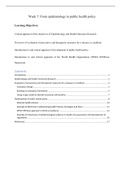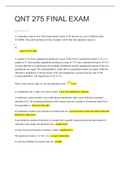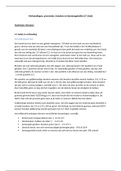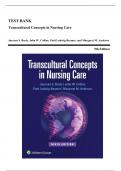Week 7: From epidemiology to public health policy
Learning Objectives:
Critical appraisal of the objectives of Epidemiology and Health Outcomes Research
Overview of evaluation of preventive and therapeutic measures for a disease or condition
Introduction to and critical appraisal of development of public health policy
Introduction to and critical appraisal of the World Health Organization (WHO) STEPwise
framework
Contents
Introduction .................................................................................................................................................. 1
Epidemiology and Health Outcomes Research ............................................................................................. 1
Evaluation of preventive and therapeutic measures for a disease or condition.......................................... 3
Evaluation Design...................................................................................................................................... 3
Building an evaluation framework ............................................................................................................ 5
Using a logic model to identify outcomes and benefits ........................................................................... 7
Development of public health policy ............................................................................................................ 8
National health policies .......................................................................................................................... 10
Example of WHO tool in elaborating Health Policies, Strategies and Plans ........................................... 11
WHO STEPwise approach to NCDs surveillance ..................................................................................... 12
Example of importance of epidemiological evidence in health risk assessment and development of
regulations .............................................................................................................................................. 16
References .................................................................................................................................................. 17
,Introduction
Epidemiology – the science of distribution of diseases and risk factors in populations – is the basis
for evidence-based recommendations and the formation of public health programmes and policies
(Davis et al. 2012, Westin 2015). Decisions on implementing programmes and policies should be
based on the best evidence available at the time (Hanson and Jones 2017). It is therefore essential
that evaluators generate the most robust evidence possible to help understand what are the benefits
and limitations of a program or policy, from the planning stage to evaluation, and in all steps in-
between. Although each country develops and modifies policies depending on identified needs
and socio-cultural context, there are some universal recommendations that come from authoritative
bodies such as the World Health Organization which are set to help countries to collect
(epidemiological) data and develop national policies and strategic plans- for example- for tackling
communicable and non- communicable diseases. Within the context of public health, policy
development includes the advancement and implementation of public health law, regulations, or
voluntary practices that influence systems, organizations, and individual behaviours to promote
improvements in health. This week we will define Health Outcomes Research and its role in
epidemiology and public health policy; we will describe how prevention and/or treatment
programs can be evaluated, and we will look more in detail what development of public health
policy is, and what the role of WHO is that context is.
Epidemiology and Health Outcomes Research
Nowadays, healthcare professionals are increasingly turning to Health Outcomes Research for the
evidence-based guidance they need to prevent or treat diseases. In that context, Health Outcomes
Research is a methodology used to identify and measure the link between treatments or
1
, interventions delivered and the actual outcomes achieved (Harvard T.H. Chan 2015). For example,
outcomes research studies can be used to:
Determine if specific treatments are over- or under-used for populations of patients
Incorporate non-traditional outcomes measures such as patient preference and quality of life
into the decision-making process
Help match treatments to individual patients, based on patient-specific criteria.
Health Outcomes research is valuable largely because of the scope of issues it addresses: it uses
data from medical records, insurance databases, patient questionnaires, and the measures
of frequency and association of exposure and outcome which are commonly reported in
epidemiological research. Those data are used by a diverse and growing number of organizations
– health care delivery organizations, insurers, pharmaceutical companies, and governments – to
help them make better decisions about the value of different treatments and interventions. It is
important as by improving the decision-making process across organizations, outcomes research
increases the value of resources spent on health care (Harvard T.H. Chan 2015). It is similarly used
to identify successful public health programs and to share the lessons learned. Health Outcomes
Research data is also being used to create measurement tools that can be used to compare different
health care related facilities and performances (Harvard T.H. Chan 2015). This makes it possible
to identify areas of weakness in resources or facilities, as well as to assess gaps in treatments or
interventions, and can help healthcare providers to address these issues and make necessary
improvements.
2
Learning Objectives:
Critical appraisal of the objectives of Epidemiology and Health Outcomes Research
Overview of evaluation of preventive and therapeutic measures for a disease or condition
Introduction to and critical appraisal of development of public health policy
Introduction to and critical appraisal of the World Health Organization (WHO) STEPwise
framework
Contents
Introduction .................................................................................................................................................. 1
Epidemiology and Health Outcomes Research ............................................................................................. 1
Evaluation of preventive and therapeutic measures for a disease or condition.......................................... 3
Evaluation Design...................................................................................................................................... 3
Building an evaluation framework ............................................................................................................ 5
Using a logic model to identify outcomes and benefits ........................................................................... 7
Development of public health policy ............................................................................................................ 8
National health policies .......................................................................................................................... 10
Example of WHO tool in elaborating Health Policies, Strategies and Plans ........................................... 11
WHO STEPwise approach to NCDs surveillance ..................................................................................... 12
Example of importance of epidemiological evidence in health risk assessment and development of
regulations .............................................................................................................................................. 16
References .................................................................................................................................................. 17
,Introduction
Epidemiology – the science of distribution of diseases and risk factors in populations – is the basis
for evidence-based recommendations and the formation of public health programmes and policies
(Davis et al. 2012, Westin 2015). Decisions on implementing programmes and policies should be
based on the best evidence available at the time (Hanson and Jones 2017). It is therefore essential
that evaluators generate the most robust evidence possible to help understand what are the benefits
and limitations of a program or policy, from the planning stage to evaluation, and in all steps in-
between. Although each country develops and modifies policies depending on identified needs
and socio-cultural context, there are some universal recommendations that come from authoritative
bodies such as the World Health Organization which are set to help countries to collect
(epidemiological) data and develop national policies and strategic plans- for example- for tackling
communicable and non- communicable diseases. Within the context of public health, policy
development includes the advancement and implementation of public health law, regulations, or
voluntary practices that influence systems, organizations, and individual behaviours to promote
improvements in health. This week we will define Health Outcomes Research and its role in
epidemiology and public health policy; we will describe how prevention and/or treatment
programs can be evaluated, and we will look more in detail what development of public health
policy is, and what the role of WHO is that context is.
Epidemiology and Health Outcomes Research
Nowadays, healthcare professionals are increasingly turning to Health Outcomes Research for the
evidence-based guidance they need to prevent or treat diseases. In that context, Health Outcomes
Research is a methodology used to identify and measure the link between treatments or
1
, interventions delivered and the actual outcomes achieved (Harvard T.H. Chan 2015). For example,
outcomes research studies can be used to:
Determine if specific treatments are over- or under-used for populations of patients
Incorporate non-traditional outcomes measures such as patient preference and quality of life
into the decision-making process
Help match treatments to individual patients, based on patient-specific criteria.
Health Outcomes research is valuable largely because of the scope of issues it addresses: it uses
data from medical records, insurance databases, patient questionnaires, and the measures
of frequency and association of exposure and outcome which are commonly reported in
epidemiological research. Those data are used by a diverse and growing number of organizations
– health care delivery organizations, insurers, pharmaceutical companies, and governments – to
help them make better decisions about the value of different treatments and interventions. It is
important as by improving the decision-making process across organizations, outcomes research
increases the value of resources spent on health care (Harvard T.H. Chan 2015). It is similarly used
to identify successful public health programs and to share the lessons learned. Health Outcomes
Research data is also being used to create measurement tools that can be used to compare different
health care related facilities and performances (Harvard T.H. Chan 2015). This makes it possible
to identify areas of weakness in resources or facilities, as well as to assess gaps in treatments or
interventions, and can help healthcare providers to address these issues and make necessary
improvements.
2








